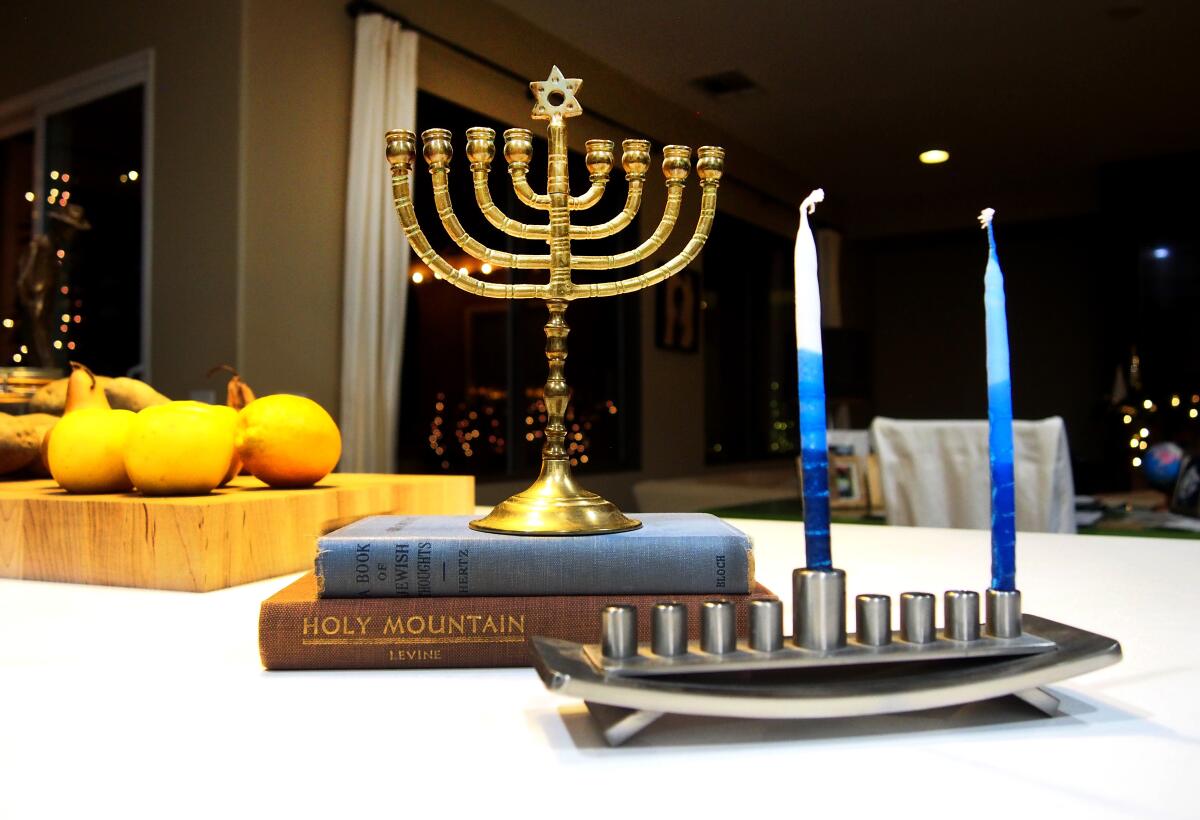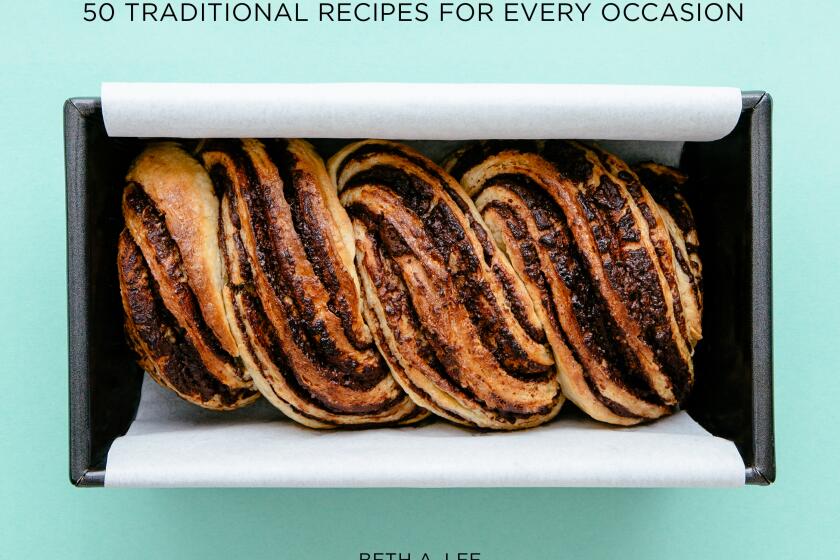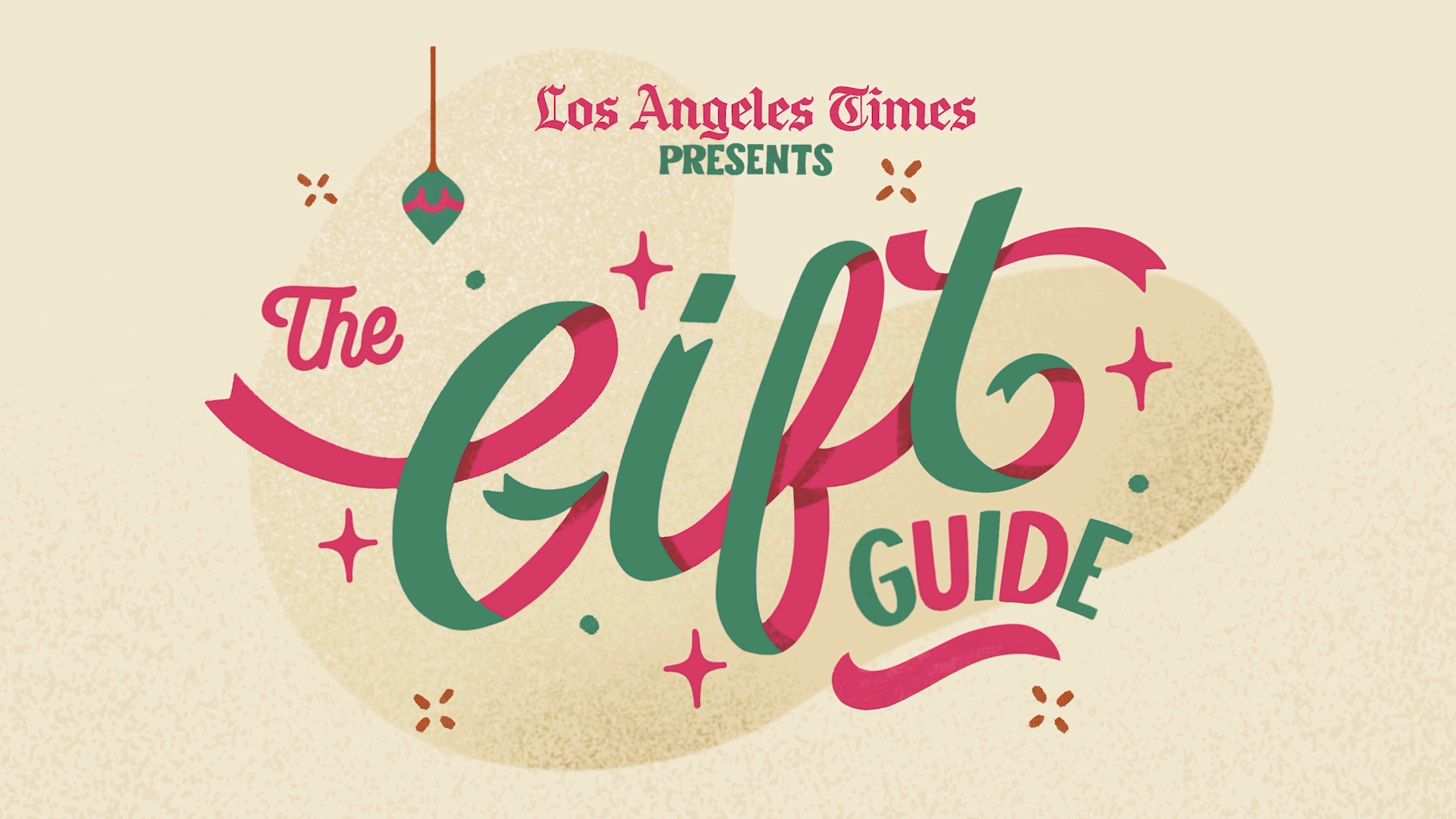Op-Ed: This Hanukkah, a broken menorah and a memory that may not exist

- Share via
My Hanukkah menorah is broken. My wife tells me there’s a piece missing, a branch that is supposed to go from the Star of David in the center of the candelabra to a slot on the back to hold the shamus — the candle used to light all the others. It’s been broken for 50 years or so, by my estimation, since I can’t recall it ever looking any different than it does now. Still, we don’t want to burn the house down, so we placed it on a shelf where I can still see it and swapped in a slick new menorah that looks like a piece of modern art: brushed chrome, smooth lines. It’s important to create new traditions.
Which is funny because the truth is that I’m not much of a Jew; my faith is more in metaphor than God. I believe in being a witness to history, in many of the teachings of the Talmud, in the practice of asking questions, of the sacred being open for discussion and interpretation. But love and trauma have caused me to believe in an afterlife that no holy book makes space for, and that what I hold dear, at the end, is for me. So, when I light my menorah, it isn’t to recall the rededication of the Temple of Jerusalem, it is to light the way to my own past.
Faith Kramer’s ’52 Shabbats’ recipes include Pomegranate Molasses Brisket, and Beth A. Lee’s ‘The Essential Jewish Baking Cookbook’ includes Bimuelos.
This time of year, I often find myself beset by a memory that I’m not sure is real. It’s about a book that I keep on my desk: “A Book of Jewish Thoughts,” edited by Joseph Herman Hertz. The hardcover is blue moire, the spine gilt-lettered in navy, the title embossed in an austere roman font. It has been in my family for 80 years.
In my memory, I am 7 years old and my grandfather, Poppa Dave, is in his basement in Walla Walla, Wash., smoking a cigar and reading the book. It was one of three books that were always stacked on the side table next to his chair — one blue, one burnt orange, one black — in descending order of size. I sat on his lap. It was late December, too cold to be outside. I asked him what his book was about, and he said, “Do you know what it means to be Jewish?”
He flipped through the book and told me how, when he was my age, he’d escaped the pogroms — massacres of Jews in the Russian Empire — in Bar, Ukraine, his family stuffed in sacks of potatoes, his infant brother dying in his arms. How they’d come to live in Walla Walla. How his last name — Barer — which is my middle name — forever marked them as being from that place, no matter where they went. And then he closed the book. “Can you imagine leaving your home behind, tomorrow, forever?” I could not. I cannot.
Though, now, I worry I am conflating experiences. Didn’t we usually go to Walla Walla in the summer? Maybe he was reading one of the other books, maybe it was the burnt orange one — “Holy Mountain: Two Paths to One God” — which is beside me now. Yes. It was late July, not December, too hot to smoke outside. Afterward, he showed me the framed family tree on the wall, the cigar smoke growing stale in the room, faces of long-dead Jews with my hairline, my eyes, my thick eyebrows staring back at me, some of whom never left Bar, are there still. This was my cousin, he says.
Or maybe it wasn’t in Walla Walla at all and we were in Palm Springs, where I often spent Hanukkah with my grandparents, and the book was really the sports page, but the question and the story were the same. Fifty-plus years into my own life, closer in age to my grandfather than I’ve ever been, and I’m still trying to find the answer, returning time and again to the thoughts in that little blue book, which I inherited along with the broken menorah, more than a decade ago when my mother died.
Here are our suggestions for unique gifts and other ideas for the 2021 holiday season.
I began to read it then, first to feel a connection to a family tree that no longer had any tall branches, later to understand the roots and, later still, when an idea for a book began to take shape in my mind: a hit man forced to hide out as a rabbi, though he was not Jewish — a metaphor for my own metaphysical struggle.
Now, I have read the Torah, the Talmud, much of the Midrash (early Jewish commentary or interpretation of biblical texts), my shelves filled with theology and eschatology, and I am no closer to answering my grandfather’s questions. Which is the essence of any spiritual journey: knowing that there are things you will never know.
Tomorrow, when Hanukkah begins, I will light this new menorah, will stand in its flickering shadow, reciting a prayer I may not believe, but content in the unknowing and in remembering a memory that may not exist; free, in any case, to believe.
Tod Goldberg is the author of more than a dozen books, most recently “The Low Desert: Gangster Stories.” He directs the Low Residency MFA Program in Creative Writing and Writing for the Performing Arts at UC Riverside. @todgoldberg
More to Read
A cure for the common opinion
Get thought-provoking perspectives with our weekly newsletter.
You may occasionally receive promotional content from the Los Angeles Times.












